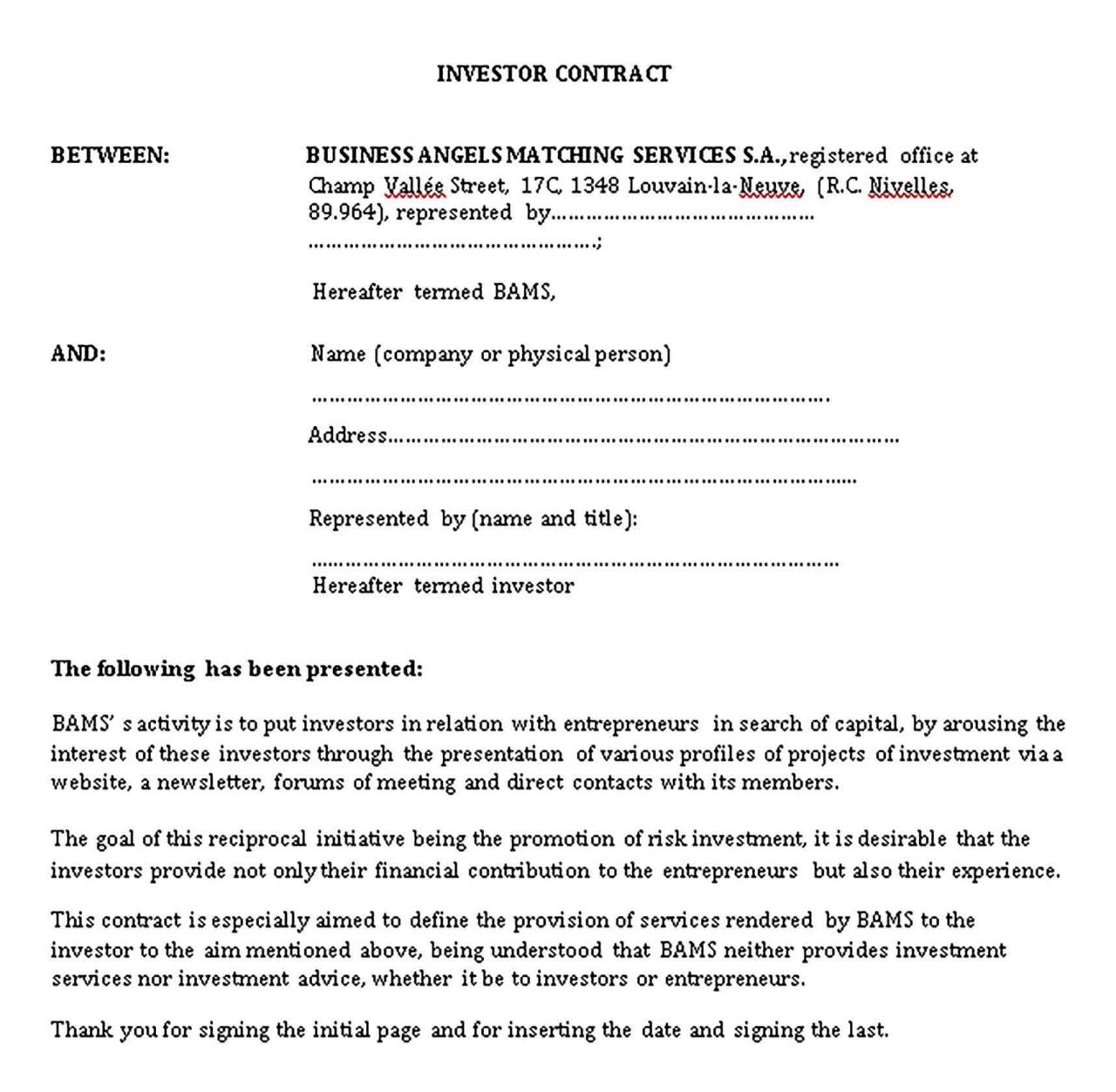Agreement between a company and an individual – Navigating the intricacies of agreements between companies and individuals can be a complex task. This guide delves into the essential elements of such agreements, providing a roadmap to understanding their purpose, terms, and implications.
From defining the roles of the parties involved to outlining the legal framework governing the agreement, this comprehensive guide covers all aspects of this important topic.
Parties Involved
The agreement involves two parties: a company and an individual.
The company, [Company Name], is a reputable organization engaged in [Industry]. It is well-known for its commitment to [Values or Goals].
Company’s Role
- Provide [Products or Services] to the individual.
- Ensure the quality and timely delivery of [Products or Services].
- Maintain open communication and address any concerns raised by the individual.
Individual’s Role
- Receive [Products or Services] from the company.
- Provide feedback and collaborate with the company to improve [Products or Services].
- Comply with the terms and conditions Artikeld in the agreement.
Purpose of Agreement

This Agreement sets forth the terms and conditions governing the relationship between the Company and the Individual for the purpose of providing consulting services.
Like any agreement between a company and an individual, it’s important to read the fine print. For instance, did you know you can’t use AirTags with an Android phone ? It’s true! So, before you sign on the dotted line, make sure you understand what you’re getting into.
The specific objectives and goals of this Agreement are to:
- Provide the Company with access to the Individual’s expertise and experience in the field of [field of expertise].
- Enable the Individual to provide consulting services to the Company on a freelance basis.
- Establish the financial and other terms of the Individual’s engagement with the Company.
Terms and Conditions
This agreement Artikels the terms and conditions that govern the relationship between the company and the individual. These terms are intended to protect the rights and interests of both parties and ensure a mutually beneficial collaboration.
By entering into this agreement, both parties agree to abide by the following terms and conditions:
Key Obligations
- The company agrees to provide the individual with access to its products and services as specified in the agreement.
- The individual agrees to use the company’s products and services in accordance with the terms of this agreement and applicable laws.
- Both parties agree to maintain the confidentiality of any information disclosed during the course of this agreement.
Specific Clauses
- Term of Agreement:The term of this agreement shall commence on the date of execution and continue for a period of one year. The agreement may be renewed for additional periods by mutual agreement of the parties.
- Termination:Either party may terminate this agreement for any reason by providing written notice to the other party at least 30 days prior to the desired termination date.
- Governing Law:This agreement shall be governed by and construed in accordance with the laws of the State of California.
Consideration

Consideration refers to the exchange of value between the parties involved in an agreement. It is the legal basis for enforcing a contract and ensures that both parties receive something of value in return for their promises or obligations.
In this agreement, the company agrees to provide [specify services or goods] to the individual. In exchange, the individual agrees to [specify compensation or other benefits].
Compensation
- The compensation or other benefits provided to the individual may be in the form of:
- Money (salary, wages, bonuses, etc.)
- Goods or services (e.g., a car, a vacation, etc.)
- Property (e.g., a house, land, etc.)
- Intangible benefits (e.g., stock options, training, etc.)
The amount or value of the compensation or other benefits is typically determined through negotiation between the parties and is based on factors such as:
- The value of the services or goods being provided
- The individual’s skills, experience, and qualifications
- The market value for similar services or goods
- The financial resources of the company
Duration and Termination

This agreement shall remain in effect for a period of [insert duration], commencing on [start date] and expiring on [end date]. Either party may terminate this agreement for cause upon 30 days’ written notice to the other party.
Yo, agreements between companies and individuals can be like a closed-end fund, right? A closed-end fund is an investment company that’s like a one-time deal, and the shares don’t trade on the stock market. Similarly, an agreement between a company and an individual can be a specific deal that’s set in stone.
Termination for Cause
- Material breach of any term or condition of this agreement.
- Insolvency or bankruptcy of either party.
- Any other event that makes it impracticable or impossible for either party to perform its obligations under this agreement.
Confidentiality: Agreement Between A Company And An Individual
The Agreement places great emphasis on the protection of sensitive information exchanged between the parties. It establishes clear guidelines regarding the handling, disclosure, and use of confidential data.
When a company and an individual come to an agreement, it’s like a handshake that seals the deal. In the world of business, these agreements can take many forms, from contracts to partnerships. For instance, a U.S. manufacturing company operating a subsidiary in an LDC might enter into an agreement with a local supplier to provide raw materials.
These agreements are essential for ensuring that both parties understand their rights and responsibilities and that the business relationship runs smoothly.
Both parties acknowledge the importance of maintaining the confidentiality of such information and agree to take all reasonable steps to prevent its unauthorized disclosure or use. The restrictions apply not only to the duration of the Agreement but also for a specified period afterward.
Disclosure Restrictions, Agreement between a company and an individual
- Confidential information may only be disclosed to authorized individuals within each party’s organization who have a legitimate need to know.
- Prior written consent must be obtained from the disclosing party before any confidential information is shared with third parties.
- The receiving party must use reasonable efforts to protect the confidentiality of the information and prevent its unauthorized use or disclosure.
Dispute Resolution
The resolution of disputes or disagreements is an important aspect of any agreement. To ensure a fair and equitable process, this agreement Artikels the methods established for resolving such matters.
In the event of a dispute or disagreement, the parties agree to make a good faith effort to resolve the matter through negotiation and discussion. If the parties are unable to resolve the dispute through negotiation, they may resort to the following methods of dispute resolution:
Arbitration
Arbitration is a form of alternative dispute resolution in which the parties present their case to a neutral third party, known as an arbitrator. The arbitrator will then make a binding decision on the dispute.
When an agreement between a company and an individual is established, both parties should adhere to the terms. Many companies, such as a company with an animal in its logo , value their reputation and strive to maintain positive relationships with their clients.
By fulfilling their obligations and respecting the terms of the agreement, both the company and the individual can foster a mutually beneficial and long-lasting partnership.
Mediation
Mediation is a form of alternative dispute resolution in which the parties meet with a neutral third party, known as a mediator. The mediator will facilitate a discussion between the parties and help them reach a mutually acceptable resolution.
An agreement between a company and an individual can take many forms, from employment contracts to investment deals. In one such instance , a company received $500 of cash as an additional investment, strengthening their financial position. This type of agreement can be mutually beneficial, providing the company with capital and the individual with a return on their investment.
Legal Proceedings
If the parties are unable to resolve the dispute through arbitration or mediation, they may resort to legal proceedings. Legal proceedings involve filing a lawsuit in court and having a judge or jury decide the dispute.
Governing Law
The interpretation, validity, and enforcement of this Agreement shall be governed by and construed in accordance with the laws of the State of California, without regard to its conflict of laws principles.
It’s like when you make a deal with a company, you sign an agreement, right? Well, when you create an NFT, you’re making a similar agreement, but it’s on the blockchain. And guess what? You can totally do it on your Android phone! Check out this article to learn how.
It’s like, super easy, and you’ll be minting NFTs like a pro in no time.
The parties agree that the choice of California law is made for the convenience of the parties and does not reflect any intention to create a contract that is not subject to the laws of any other jurisdiction.
Yo, so, when a company and an individual make an agreement, it’s a done deal, right? Like, you can’t just switch teams and get your iTunes on an Android . It’s a whole other ball game. But hey, at least you can still rock out to your fave tunes on Spotify or Apple Music, right? And besides, agreements are meant to be honored, like a boss!
Choice of Law
The choice of California law as the governing law of this Agreement means that the laws of California will apply to all aspects of the Agreement, including its interpretation, validity, and enforcement.
This means that the courts of California will have jurisdiction over any disputes that arise under this Agreement, and that the laws of California will be used to decide those disputes.
Execution
The execution of this agreement signifies the binding acceptance of its terms by both parties. The agreement must be signed by authorized representatives of both the company and the individual, and the signatures must be witnessed by a notary public or other authorized witness.
Legal Requirements and Formalities
The execution of this agreement is subject to the following legal requirements and formalities:
- The agreement must be in writing and signed by both parties.
- The signatures must be witnessed by a notary public or other authorized witness.
- The agreement must be notarized if required by law.
Conclusion
Understanding the nuances of agreements between companies and individuals empowers both parties to enter into these arrangements with confidence. By carefully considering the terms and conditions Artikeld in this guide, you can ensure that your agreement serves its intended purpose and protects the interests of all parties involved.
Essential FAQs
What are the key elements of an agreement between a company and an individual?
The key elements include the parties involved, the purpose of the agreement, the terms and conditions, the consideration, the duration and termination, confidentiality, dispute resolution, governing law, and execution.
What are the different types of agreements between companies and individuals?
There are various types of agreements, including employment agreements, independent contractor agreements, non-disclosure agreements, and service agreements.
What should be considered when drafting an agreement between a company and an individual?
When drafting an agreement, it is important to clearly define the roles and responsibilities of each party, the purpose and objectives of the agreement, the terms and conditions, and the legal implications.